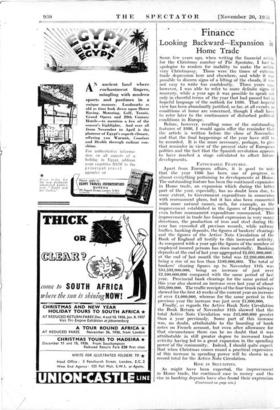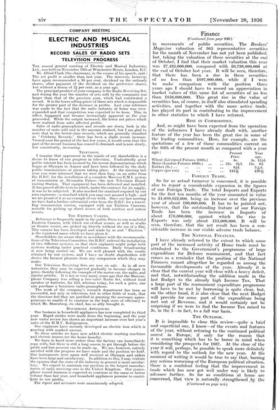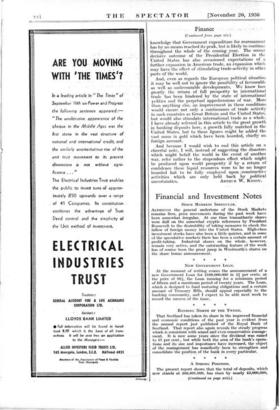Finance
Looking Backward—Expansion in Home Trade SOME few years ago, when writing the financial article for the Christmas number of The Spectator, I had • to apologise to readers for inability to make the article very Christmassy. Those were the times of extreme trade .depression here and elsewhere, and while it was possible to discern signs of a lifting of the clouds, it was not easy to write too confidently. _Three years ago, however, I was able to refer to more definite signs of recovery, while a year ago it was possible to speak not only in cheerful terms of the year that had passed but in hopeful language of the outlook for 1936. That hopeful view has been abundantly justified, so far, at all events, as conditions at home are concerned, though I shall have to refer later to the continuance' Of disturbed political conditions in Europe.
Before, however, recalling some of the outstanding featurei of 1936, I would again offer the reminder that the article is written before the "clOse of November and that the final happenings of the year have still to be recorded. It is the more necessary, perhaps, to give that reminder in view of the present state of- European polities and the fact that the Spanish revolution appears to have reached a stage calculated to affect future developments.
-" FAVOURABLE FEATURES.
Apart from European affairs, it is good to note that the year ,1936 has been one of progress; in almost everything pertaining to developments at Home. The outstanding feature has been the continued expansion in Home trade, an expansion which during the latter part of the year, especially, has no doubt been due, to some extent, to Government expenditure in connexion with rearmament plans, but it has also been connected with more natural causes, such, for example, as the improvement established in the figures of Employment even before rearmament expenditure commenced. This improvement in trade has found expression in very many directions, the production of iron and steel during the year has exceeded all previous records," while railway traffics, banking deposits, the figures of bankers' clearings and the figures of the Active Note Circulation of the Bank of England all testify to this increased activity. As compared with a year ago the figures of the number of employed insured persons has risen materially. Banking deposits at the end of last year aggregated 12,091,000,000 : at the end of last month the total was £2,280,000,000, being a rise of no less than £189,000,000. The total of bankers' clearing figures up to November 11th was £54,533.,000,000, being an increase of -just over £2,100,000,000 compared with the same period of last year. Provincial bank clearings for the same period_ of . this year also showed an increase over last year of about .165,000,000. The traffic receipts of the four trunk railways showed for the first 45 weeks of the current year an increase of over £4,000,000, whereas for the same period in the previous year the increase was just over £1,000,000. '
Finally, as regards the Active Bank Note Circulation the Bank Return of November 11th showed that the total Active Note Circulation was £45,000,000 greater than a year previously. Some part of this increase was, no doubt, attributable to the hoarding of bank notes on French account, but even after allowance for that circumstance there can be no doubt that it was attributable in still greater degree to increased trade activity having led to a great expansion in the spending power of the'conimunity. Indeed, I should quite expect that when Christmas comes round a practical expression of this increase in spending power will be shown in a record total for the Active Note Circulation.
RISE IN SECURITIES.
As might have been expected, the improvement in Home trade, the continued ease in money and the -rise in banking deposits have also found their expression (Continued on page xiv.)
Finance
(Continued from page 930) in movements of public securities. The Bankers' Magazine valuation of 365 representative securities for. the month of-November has not yet been published, but, taking the valuation of these securities at the end of October, I find that their market valuation this year was £7,435,000,000, compared with £6,738,000,000 at the end of October last year. It will be seen, therefore, that theic has. been a rise in these securities of no less than £697,000,000, while if I were to make comparison . with the position three years ago I should have to record an appreciation in market values of this same list of securities of no less than £856,000,000. This great rise in the value of securities has, of course, in itself also stimulated spending activities, and together with the more active trade, has played its part in contributing to the improvement in other statistics to which I have referred.
RISE IN COMMODITIES.
And, as might have been expected from the operation of the influences I have already dealt with,' another feature of the year has been the great rise in some of the leading commodities. Here, for example, are the quotations of a few of those commodities current on the 16th of the present month as compared with a year ago : Present Year
Price. ago.
Wheat (Liverpool Futures 100lb.) .. 8s. 5s. 114d.
Maize (London Futures 4901b.) 21s. 44d. 15s. 9d.
Rubber (lb.) 81-d. 5 to. Copper (per ton) .. £43 4 £39
FOREIGN TRADE.
So far as actual turnover is- concerned,- it is possible also to report a considerable expansion in the figures of our ForeignTrade.. The total Imports and Eiports for the first ten months _ of the year amounted in value to .£1,099,922;000, being an increase over the. prei'ious year of about £90,000,000. It has to be pointed out, hifivever, that the outstanding featUre of our Foreign Trade has been the increase- . Impoits of about £76,000,000, • against which the rise in Exports 'was only about £15,006,000.* It will be seen, therefore, that the net result has been a con- siderable increase in our visible adverse trade balance. '
THE NATIONAL FINANCES.
I have already referred to the extent to which some part of the • increased activity of Home trade must be attributed to the Government's programme of large expenditure for Defence rearmament, and that fact comes as a reminder that the position of the National Finances cannot altogether be regarded as among the favourable developments of the year. Already it is clear that the current year will close with a heavy deficit, and that, notwithstanding the addition made in the last Budget to the already high Income Tax. That a large part of the rearmament expenditure programme will have to be met by borrowing is quite clear, but, on the other hand, it is also clear that the next Budget will provide for some part of the expenditure being met out of. Revenue, and it would certainly not be surprising if we were to find the Income Tax raised to 5s. in the 1—in fact, to a full war basis.
THE OUTLOOK. •
It is impossible to close this review—quite a brief and superficial one, I know—of the events and features of the year, without referring to the continued political unrest . in Europe; if only for the reason that it is something which has- to be borne in mind when considering the prospects for 1937. At the close of-the year it-will, perhaps, be possible to speak more definitely with regard to the outlook for the new year. At the anciMent-01 writing it would be true to say that, barring any serious worsening of the European political situation, There is a confident feeling that the improvement in trade which has now got well under way is likely to ,advance further. So far as conditions at home are concerned, that view is naturally_ strengthened by the (Continued on page xvi.)
Finance
(C'ontinued front page xiv.)
knowledge that Government expenditure for rearmament has by no means reached its peak, but is likely to continue throughout the whole of the coming year. The recent decisive outcome of the Presidential Election in the United States has also occasioned expectations of a further expansion in American trade, an expansion which may have the effect of stimulating trade-activity in other parts of the world.
And, even as regards the European political situation it may be well not to ignore the possibility of favourable as well as-unfavourable developments. We know how greatly the return of full prosperity to international trade has been hindered by the state of international politics and the perpetual apprehensions of war. More than anything else, an improvement in these conditions would ensure not only a continuance of trade activity in such countries as Great Britain and, the United States, but would also stimulate international trade as a whole. I have already referred in this article to the great growth in banking deposits here, a growth fully matched in the United States, but to these figures might be added the vast sums in gold which have been hoarded, chiefly on foreign account.
And because I would wish to end this article on a cheerful note, I will, instead of suggesting the disasters which might befall the world in the event of another war, refer rather to the stupendous effect which might be produced upon world prosperity if by a return of confidence these liquid resources were to be no longer hoarded but to be fully employed upon ..constructiv e activities which are only held back by political






























































 Previous page
Previous page